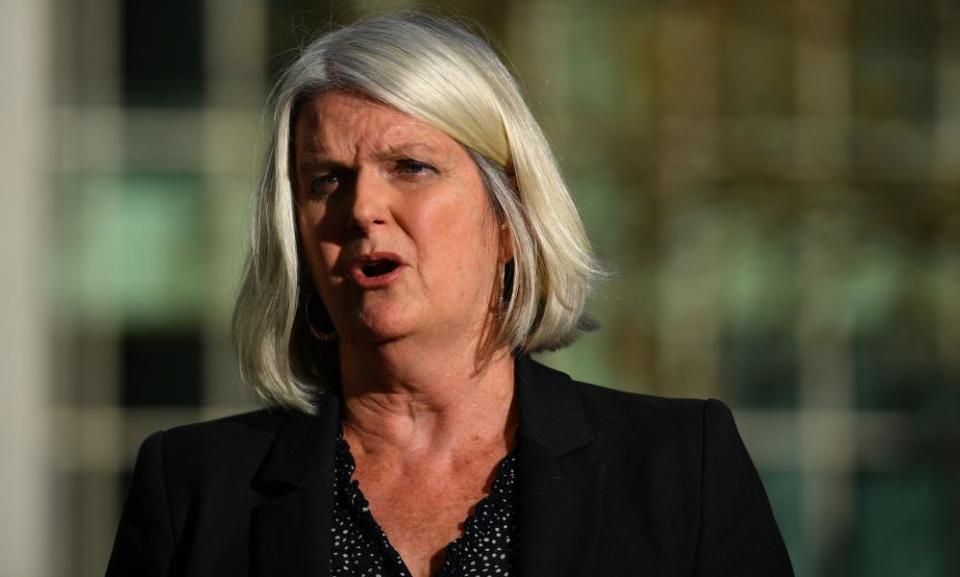Charities blast ‘unfair’ law changes they say will silence dissent during elections

Australian Conservation Foundation says legislation ‘conflates advocacy with running for political office’
Australian charities have warned “fundamentally unfair” laws rushed through parliament will muzzle them and silence dissent during elections.
The government, with Labor’s support, passed amendments to electoral laws on Wednesday that will force charities to declare their donors with retrospective effect.
The changes will require charities that participate in Australian democracy to register as a “significant third party” and declare their donors if their electoral expenditure rises above a threshold of $250,000. That is a halving of the current $500,000 threshold.
The changes are also being applied retrospectively, forcing charities to disclose donations associated with past activities.
The sector fears the changes will dissuade charities from advocating on political issues during election campaigns.
Charities have warned the concept of “electoral expenditure” is vague and broad, and fear it will apply to their advocacy on political issues, rather than activities related to voting and elections.
The amendments were passed on Wednesday after Labor negotiated changes, including raising the disclosure threshold from the proposed $100,000 to $250,000 and describing organisations captured by the rules as “significant third parties” instead of political campaigners.
The latter change was hoped to avoid compromising an organisation’s charity status, which can be affected if they engage in political advocacy.
But Hands off Our Charities, a major alliance of charities, says the amendments do not go far enough. The group’s coordinator, Ray Yoshida, said Labor had not consulted with the sector before agreeing to pass the bill.
“Overall we are disappointed in the outcome,” he told the Guardian. “It was a really unnecessary attack from the Morrison government on the charity sector and the capacity of civil society voices and community voices to engage in important political debates during election periods.”
Yoshida said the changes would also impose a significant new administrative burden on already stretched charities.
The Australian Conservation Foundation, which is expected to be captured by the new threshold, said the legislation “unfairly and incorrectly conflates advocacy with running for political office”.
“As it reduces the expenditure threshold and applies it retrospectively, ACF and other organisations will now be assigned to this onerous category for past lawful, non-partisan activities,” chief executive Kelly O’Shanassy said.
“I have not seen another piece of legislation that has the potential to so severely muffle community voices as this one.”
The Australian Council of Social Service fears the changes will stifle community voices and prevent them from advocating for policy change.
“Everyone across the country benefits when charities are able to advocate for systemic policy reform,” chief executive Cassandra Goldie said. “It strengthens the decisions made by the government, improves the services delivered and ensures transparency, accountability and integrity.”
Labor appears to have agreed to the amended legislation after the government agreed not to introduce the highly controversial voter ID laws.
The shadow assistant minister for charities, Andrew Leigh, told Guardian Australia that Labor opposed the bill but had done a deal because “it was clear that crossbench members were refusing to block the government’s attacks on our democracy”.
But key crossbenchers Stirling Griff, Rex Patrick and Jacqui Lambie dispute that, citing their opposition to retrospective changes, suggesting numbers were sufficient to block the bill.
Leigh said the changes would “mean that fewer small charities and not-for-profits are caught up in disclosure requirements” and Labor had also defeated “the attempt to introduce Trump-style voter identification laws”.
“While the Senate amendments we’ve secured are the best achievable outcome for charities, a Labor government would revisit this framework.”
The bill returned to the lower house on Thursday, but passed easily despite Greens MP Adam Bandt lambasting Labor and the Coalition for “this dodgy deal”.
The Australian Democracy Network’s executive director Saffron Zomer said the process had been “rushed” and the failure to send it for inquiry was “a blow to good governance”.
Related: Senate scuttles Coalition crackdown on charity advocacy work
Zomer said the sector was in “shock” and could not believe Labor had supported the legislation.
“This legislation makes significant changes to the Electoral Act and applies those changes retroactively,” Zomer said. “It’s bad law making and is fundamentally unfair.
“It is beyond disappointing that our government would spend its time on stifling civic participation when it could be focused on important reforms that would really make democracy work better for all, such as political donation caps and a strong federal ICAC.”
It’s not the first time the Morrison government has been accused of attempting to silence charities in recent months.
The government had attempted to give the charity regulator new powers to investigate and de-register charities on the mere suspicion of minor offences committed by its members, including trespass. The sector feared that would deter charities from engaging in protest and advocacy.
The Senate scuttled the changes last week.

 Yahoo Finance
Yahoo Finance 